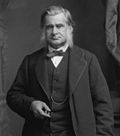Thomas Henry Huxley
Thomas Henry Huxley (May 4, 1825 – June 29, 1895) was an English biologist and educator. He was a strong advocate of Charles Darwin's theory of evolution. Huxley is often referred to as "Darwin's Bulldog" due to his ardent support for Darwin's theory.
Early Life[edit]
Huxley was born in Ealing, London, England. He was the youngest of eight children. His father was a schoolteacher, and his mother was a housewife. Despite his family's financial struggles, Huxley was able to receive a good education through scholarships and the support of his siblings.
Career[edit]
Huxley began his career as a surgeon's apprentice, but his interest in natural history led him to join the HMS Rattlesnake as an assistant surgeon and naturalist. During this voyage, Huxley made significant contributions to the field of marine biology.
In 1851, Huxley returned to England and began working at the University of London as a lecturer in comparative anatomy. He was a prolific writer and speaker, and his lectures and writings played a crucial role in popularizing science in Victorian England.
Huxley was a strong supporter of Darwin's theory of evolution and played a significant role in its acceptance within the scientific community. He famously defended the theory in a debate with Samuel Wilberforce, the Bishop of Oxford, in 1860.
Personal Life[edit]
Huxley married Henrietta Anne Heathorn in 1855. They had eight children, including Leonard Huxley, who became a prominent writer and editor.
Death and Legacy[edit]
Huxley died on June 29, 1895. His contributions to science and education have had a lasting impact, and he is often considered one of the most influential figures in the history of biology.
See Also[edit]
References[edit]
<references />
External Links[edit]
Ad. Transform your life with W8MD's Budget GLP-1 injections from $75


W8MD offers a medical weight loss program to lose weight in Philadelphia. Our physician-supervised medical weight loss provides:
- Weight loss injections in NYC (generic and brand names):
- Zepbound / Mounjaro, Wegovy / Ozempic, Saxenda
- Most insurances accepted or discounted self-pay rates. We will obtain insurance prior authorizations if needed.
- Generic GLP1 weight loss injections from $75 for the starting dose.
- Also offer prescription weight loss medications including Phentermine, Qsymia, Diethylpropion, Contrave etc.
NYC weight loss doctor appointmentsNYC weight loss doctor appointments
Start your NYC weight loss journey today at our NYC medical weight loss and Philadelphia medical weight loss clinics.
- Call 718-946-5500 to lose weight in NYC or for medical weight loss in Philadelphia 215-676-2334.
- Tags:NYC medical weight loss, Philadelphia lose weight Zepbound NYC, Budget GLP1 weight loss injections, Wegovy Philadelphia, Wegovy NYC, Philadelphia medical weight loss, Brookly weight loss and Wegovy NYC
|
WikiMD's Wellness Encyclopedia |
| Let Food Be Thy Medicine Medicine Thy Food - Hippocrates |
Medical Disclaimer: WikiMD is not a substitute for professional medical advice. The information on WikiMD is provided as an information resource only, may be incorrect, outdated or misleading, and is not to be used or relied on for any diagnostic or treatment purposes. Please consult your health care provider before making any healthcare decisions or for guidance about a specific medical condition. WikiMD expressly disclaims responsibility, and shall have no liability, for any damages, loss, injury, or liability whatsoever suffered as a result of your reliance on the information contained in this site. By visiting this site you agree to the foregoing terms and conditions, which may from time to time be changed or supplemented by WikiMD. If you do not agree to the foregoing terms and conditions, you should not enter or use this site. See full disclaimer.
Credits:Most images are courtesy of Wikimedia commons, and templates, categories Wikipedia, licensed under CC BY SA or similar.
Translate this page: - East Asian
中文,
日本,
한국어,
South Asian
हिन्दी,
தமிழ்,
తెలుగు,
Urdu,
ಕನ್ನಡ,
Southeast Asian
Indonesian,
Vietnamese,
Thai,
မြန်မာဘာသာ,
বাংলা
European
español,
Deutsch,
français,
Greek,
português do Brasil,
polski,
română,
русский,
Nederlands,
norsk,
svenska,
suomi,
Italian
Middle Eastern & African
عربى,
Turkish,
Persian,
Hebrew,
Afrikaans,
isiZulu,
Kiswahili,
Other
Bulgarian,
Hungarian,
Czech,
Swedish,
മലയാളം,
मराठी,
ਪੰਜਾਬੀ,
ગુજરાતી,
Portuguese,
Ukrainian










